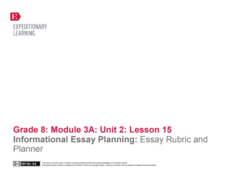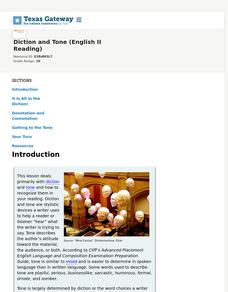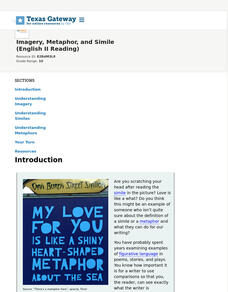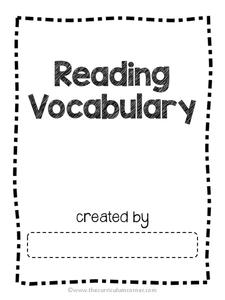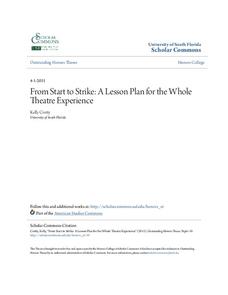Curated OER
PowerPoint Short Story Report
Students make a Microsoft PowerPoint report from a short story read in class. They summarize and paraphrase a short story identifying the six story elements: characters, setting, plot, conflict, solution, tone/mood.
Curated OER
Lots of Lines
Students see that artists make many different kinds of lines. They discuss how artists use line to show ideas such as motion, mood, or emphasis. They geet a "scribble" to transform into a picture using Colorific markers or erasable crayons.
Curated OER
Finding Our Place in Time
Students utilize interviewing skills of an historian to research the time period of the 1970's. They use prior knowledge of the 1960's to explain the mood of the country in the 1970's.
Curated OER
Drama: Working Together
Young scholars participate in a host of activities designed to encourage creativity, collaboration, and cooperation. They experience walking in different ways, greeting various types of people, and mirroring, where one student duplicates...
Curated OER
"Theseus and the Minotaur"
Students analyze the features of myths and legends. They read the myths "Theseus and the Minotaur" and "Orpheus and Eurydice," identify the myth story elements, evaluate each story for the overall theme, describe the characters, and...
Curated OER
Driving Music
Students experience both playing a musical instrument and driving a car. The two experiences tied together by one engineer. The score appears as a road, with twists and turns representing the composer's suggested shifts in mood. This...
Curated OER
Poetry Shared Reading
Students explore poetry. In this poetry lesson, students discover the qualities of good writing and the characteristics of poetry. Students practice reading poems in different ways. Studnets also discuss the mood of the poem and the...
National Endowment for the Humanities
Lesson 1: In Depth with the Full Spectrum
High schoolers study the ways in which an artist can use color. They view various images of artwork and discuss the effect of color on spacial dimensions, focal points, tone, and mood.
Curated OER
Adjectives: Moods
In this ESL activity instructional activity, students fill in the missing letters in 5 adjectives and then draw a line from each word to the picture that matches it. A word bank is provided.
Roy Rosenzweig Center for History and New Media
War and Poetry
A band of brothers or the Devil's agents? Nobel warriors freeing the oppressed or mercenaries working for the military/industrial complex? Groups examine poems from the Civil War, World War I, and World War II to determine the poets'...
Museum of Disability
Zoom!
Turn your class' focus on how wheelchairs assist individuals with disabilities to become more independent with this disabilities lesson plan. Scholars listen to a read aloud of the book, Zoom! by Robert Munsch, answer...
EngageNY
Grade 10 ELA Module 4: Unit 2, Lesson 6
What decisions might an author make about the structure of a play? Pupils participate in an evidence-based discussion about Shakespeare's choices in Macbeth. Next, scholars analyze the effect of Shakespeare's structural choices in Act 2,...
EngageNY
Informational Essay Planning: Essay Rubric and Planner
Pupils walk through the process of writing essays for their final assessment of Unbroken. They begin by reviewing the rubric using Rubric Criteria strips that assign a portion of the rubric to each pair of learners. They then participate...
EngageNY
Analyzing a Thematic Concept: Becoming Visible after Captivity
Have some dignity. Readers describe the word dignity using a word web and then sort Louie's actions into categories of reconnecting or dignity with a Visibility Double Arrow graphic organizer. They then use all of their ideas and...
EngageNY
Analyzing an Author’s Craft: Carlotta’s Journey to Justice
Find your voice. Readers look at a passage from A Mighty Long Way and discuss what it means for Carlotta to find her voice. After discussing figurative language and idioms, learners listen to the song "This Little Light of Mine" and...
EngageNY
Language Analysis: “I Have a Dream”
Middle schoolers look closely at Martin Luther King Jr's "I Have a Dream" speech and use a language analysis sheet to determine if King's sentences use active or passive voice. They then move their attention back to A Mighty Long Way to...
Texas Education Agency (TEA)
Diction and Tone (English II Reading)
Words carry baggage. In addition to their literal, denotative meaning, words also carry the weight of the associations and connotations attached to the word—the connotations of words writers use to create the tone of a piece. An...
Texas Education Agency (TEA)
Imagery, Metaphor, and Simile (English II Reading)
The sixth interactive in this series introduces learners to the power of figurative language. After studying examples of similes and metaphors, readers examine how such comparisons help them see through a writer's eyes. Interactive...
Texas Education Agency (TEA)
Imagery (English III Reading)
Picture this! The first interactive in a set of 13 shows learners how writers use imagery and sensory details to create mental pictures in readers' minds.
Curriculum Corner
Academic Reading Vocabulary
From A to Z, learners define, draw, and find examples of specific reading focus skills in an alphabetized reading vocabulary packet. Words include dialogue, theme, text structure, genre, paraphrase, and many more.
California Federation of Chaparral Poets, Inc
Poetic Devices
Have everything you need to know about the elements of poetry with a nine-page handout. Split into four categories—word sounds, meanings, arrangement, and imagery—budding poets may reference terms, read definitions, descriptions, and...
Honors College at Scholar Commons
From Start to Strike: A Lesson Plan for the Whole Theatre Experience
Introduce young thespians to all aspects of the theater. A syllabus for a one-semester drama course provides lessons that take learners from the history of drama to the many facets of play production.
Teaching Tolerance
Using Photographs to Teach Social Justice | Exposing Homelessness and Poverty
Photos can capture a complete story in a single image. Class members closely examine a photo of a homeless camp and attempt to read the story told by the picture. They then read the caption for the photograph and compare their notes with...
Teaching Tolerance
Using Photographs to Teach Social Justice | Legal Action: The Supreme Court
A social justice lesson focuses on the Supreme Court case Loving v. Virginia which struck down laws that prohibited marriages between African Americans and white Americans. The lesson begins with class members examining a photograph of...
Other popular searches
- Descriptive Words for Mood
- Mood and Tone
- Mood and Tone Worksheet
- Tone Mood
- Teaching Mood and Tone
- Author's Tone and Mood
- Colors Conveying Mood
- Mood in Literature
- Identifying Mood
- Analyzing Tone and Mood
- Spanish Grammar Subjunctive
- And Mood












